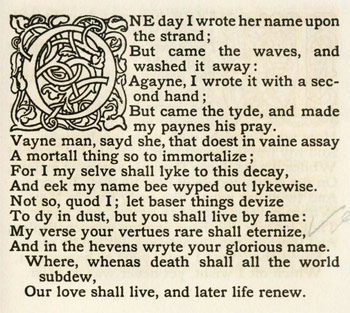Sonnet LXXV, by Edmund Spenser:
BASIC FACTS:

Title: Sonnet LXXV.
Author: Edmund Spenser.
Date of composition: 1592-1594.
Date of publication: 1595.
Collection: Amoretti and Epithalamion.
Poetic genre: Spenserian Sonnet: octave + sestet in a unique rhyme scheme. A mark of Spenserian Sonnets is that verses 8 and 9 run together in rhyme c / c. This is called the ‘Volta’ and separates the octave from the sestet.
Metric: Fourteen iambic pentameters.
Rhyme: abab bcbc cdcd ee. This rhyme scheme is used by the author in order to create a contrast between earthly objects that will disappear and heavenly ideas, which will last forever, such as his poetry.
FURTHER INFORMATION:
Major Themes:
- Mutability and decay: development of the philosophical concept of change in Universe.
- Wheel of fortune.
- ‘Avenement du moi’: Arrival of Ego, focusing on the individual. This is the reason why this era is also called ‘The Age of Individualism’.
- Metamorphosis: in this mutability, both things and people change.
- Impossibility of immortalising what is mortal.
- Human struggle to look further than temporality: Here, even the lady is given a voice.
- Idea of Apocalypse.
- Poetry as a means to immortalise the lovers: Their love will be eternal, and people in the future will know about them because of these sonnets.
Symbols:

- Sand: This reflects that it is impossible to immortalise the mortal.
- Literature as a minor form of immortality, preservation through words: One can achieve immortality through literature.
- The body and sand are mutable; poetry survives in time.
Literary devices:
- Alliteration:
“One day I wrote her name upon the strand,
But came the waves and washed it away:
Agayne I wrote it with a second hand,”
“To die in dust”.
“My verse your virtues rare shall eternize,
And in the heavens write your glorious name.
Where whenas Death shall all the world subdue,
Out love shall live, and later life renew”.
- Postposition of adjectives to confer a high style to his verse and to emphasise the importance of the quality expressed by the adjective.
“My verse your vertues rare shall eternize,”



